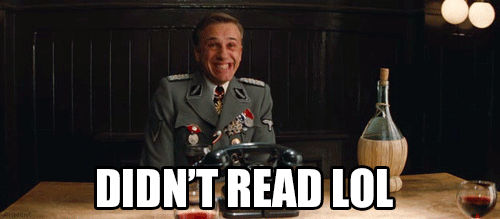- Joined
- Jun 10, 2017
- Messages
- 1,467

I just watched this talk some faggot gave at GDC on community management. Viewing is not essential to discussion but for those curious:
Though the video itself is rather uninformative, the subject is interesting and not frequently discussed in a wider context than trainwreck of the week. In a post-gg era of social media, crowdfunding, and reviewbombing where producers frequently draw consumer ire for their various misdeeds while memes condemn multi-million dollar franchises overnight, good community management is more important than ever to a healthy future in the games industry.
And yet so many fuck it up, and so obviously.
DoubleBear's controversy demonstrated how hostile communication is never advisable and inflammatory replies are unconstructive. This may seem obvious and yet even now in a certain thread we have a burgeoning case study. These examples are similar in that a main creative force was/is the liaison, understandably defensive of their work/reputation/livelihood and more susceptible to an emotional response in the face of both constructive criticism and malicious trolling than a glorified janitor might be. Smaller studios certainly can't afford to hire such a superfluous position and are forced to shoulder the burden themselves, living or dying off their own ability in the same way they do with regards to all other areas of development.
Slightly bigger guys like InXile found out the hard way how frequent lapses in communication and an overall lack of transparency during development can easily snowball unto catastrophe if left unchecked. The cold light of day shone bright upon Fargo's sweaty brow but by then the damage was done and their grave dug; ignorant, incompetent, or dishonest depending on your Edge. Despite the mea culpa, InXile's CM hire has proven to be frequently censorious, which leads us to the other end of the spectrum.
The largest fish employ community managers as full-time damage control tasked with deleting unflattering comments across the internet. Depending on the company, this can be anything from a youtube comment to flagging the video itself regardless of fair use and unswayed by the prospect of claiming monetization via content id. Larger youtubers themselves are often positioned as quasi-official community managers tasked with shoveling coal into the hype train's furnace as bots astroturf and dorito popes dew.
Some do it right, however. Typically these are smaller studios successfully navigating the treachorous waters of twitter, facebook et al. their relative low-profile and business savvy parting the waves of shit, comfortable in the warm embrace of their doting fans. These types are always small though, which begs the question: is "community management" merely a euphemism for censorship? Are small studios doomed to either die as consumer-friendly indies or live long enough to see themselves acquired by a diabolical media giant?
Though the video itself is rather uninformative, the subject is interesting and not frequently discussed in a wider context than trainwreck of the week. In a post-gg era of social media, crowdfunding, and reviewbombing where producers frequently draw consumer ire for their various misdeeds while memes condemn multi-million dollar franchises overnight, good community management is more important than ever to a healthy future in the games industry.
And yet so many fuck it up, and so obviously.
DoubleBear's controversy demonstrated how hostile communication is never advisable and inflammatory replies are unconstructive. This may seem obvious and yet even now in a certain thread we have a burgeoning case study. These examples are similar in that a main creative force was/is the liaison, understandably defensive of their work/reputation/livelihood and more susceptible to an emotional response in the face of both constructive criticism and malicious trolling than a glorified janitor might be. Smaller studios certainly can't afford to hire such a superfluous position and are forced to shoulder the burden themselves, living or dying off their own ability in the same way they do with regards to all other areas of development.
Slightly bigger guys like InXile found out the hard way how frequent lapses in communication and an overall lack of transparency during development can easily snowball unto catastrophe if left unchecked. The cold light of day shone bright upon Fargo's sweaty brow but by then the damage was done and their grave dug; ignorant, incompetent, or dishonest depending on your Edge. Despite the mea culpa, InXile's CM hire has proven to be frequently censorious, which leads us to the other end of the spectrum.
The largest fish employ community managers as full-time damage control tasked with deleting unflattering comments across the internet. Depending on the company, this can be anything from a youtube comment to flagging the video itself regardless of fair use and unswayed by the prospect of claiming monetization via content id. Larger youtubers themselves are often positioned as quasi-official community managers tasked with shoveling coal into the hype train's furnace as bots astroturf and dorito popes dew.
Some do it right, however. Typically these are smaller studios successfully navigating the treachorous waters of twitter, facebook et al. their relative low-profile and business savvy parting the waves of shit, comfortable in the warm embrace of their doting fans. These types are always small though, which begs the question: is "community management" merely a euphemism for censorship? Are small studios doomed to either die as consumer-friendly indies or live long enough to see themselves acquired by a diabolical media giant?
















